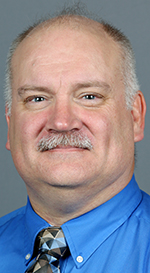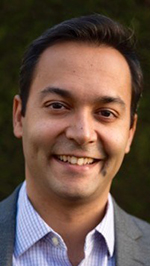When first-generation college student Deon Canon of Milwaukee started at University of Wisconsin-Stout, he worried about paying for high-cost textbooks after hearing horror stories from peers at other universities.
He quickly found out that is not the case at UW-Stout, which uses open educational resource materials and looks at other cost savings. Undergraduate students paid an average of $400 this year for textbooks and materials, far less than the average $1,500 in value they receive, according to Bob Butterfield, assistant University Library director.
“My first time picking up books I was told about the program, and I was super ecstatic at that fact and I didn’t have to worry about not affording a textbook for a class,” said Canon, a senior majoring in professional communications and emerging media and applied social science with an emphasis in history and politics. “I believe this is a program that students from other colleges would love to have.”
The use of free, open educational resource materials, which are freely accessible, openly licensed text, media and other digital assets, are growing at UW-Stout as part of the university’s textbook rental program. UW-Stout also offers digital textbooks as another cost-saving measure.
 Keeping education affordable is the goal of the third annual “E”ffordability Summit at UW-Stout Wednesday, March 27, and Thursday, March 28. A preconference session is Tuesday, March 26. K-12 educators, librarians, technical colleges and members of two- and four-year institutions are invited. About 300 people are expected to attend, up from 200 last year, Butterfield said.
Keeping education affordable is the goal of the third annual “E”ffordability Summit at UW-Stout Wednesday, March 27, and Thursday, March 28. A preconference session is Tuesday, March 26. K-12 educators, librarians, technical colleges and members of two- and four-year institutions are invited. About 300 people are expected to attend, up from 200 last year, Butterfield said.
The theme this year is Be the Change, focusing on providing, using and acquiring open educational resources and other educational content affordability ideas. The goal is to share knowledge and help keep education affordable, Butterfield said.
Canon plans to attend the summit because he has an interest in open resource materials and the idea of making textbooks and other academic research accessible to the public. “For centuries quality education was for those who had the money and luxury to attend and somewhat still is to this day,” he noted. “With open-source materials, it not only cuts down on the cost of college but also allows knowledge to be disseminated to college students and the general public. I believe it’s a win-win for all users involved.”
Butterfield said next year student fees for textbooks and other materials are dropping 12.5 percent at UW-Stout, saving students about $40 a year. “Every dollar we help save is highly important to the students,” Butterfield said. “Our mission is to advocate for the students. We work for the students. Students oversee the textbooks fees. I love that it keeps us focused on what our mission is.”
That is fantastic news, Canon said. “To some individuals, $40 might not mean a lot, but for some college students that $40 could mean the difference of continuing or dropping out of college,” he said.
UW-Stout is definitely a leader in affordable educational resources, Butterfield said, noting he is contacted by other universities across the nation interested in learning more. “I’ve got a job where I get up every morning and I get to be a voice for students,” Butterfield noted.
Conference speakers will include educators, a representative from the Wisconsin Department of Public Instruction, librarians and experts.
Advantages of open educational resources, besides no cost, are fewer restrictions on use, meaning students can keep the materials forever and faculty members can more easily add, subtract or change them.
The keynote speakers are Robin DeRosa and Rajiv Jhangiani. They are speaking at 8 a.m. both March 27 and 28. The summit is being held in the Memorial Student Center.
 DeRosa is director of interdisciplinary studies at Plymouth State University-New Hampshire. She is an internationally known advocate for open education. Her research and activism focus on increasing public access to knowledge, critically rethinking the profit motive in education and piloting new architectures for programs and institutions that empower and center learners in their design.
DeRosa is director of interdisciplinary studies at Plymouth State University-New Hampshire. She is an internationally known advocate for open education. Her research and activism focus on increasing public access to knowledge, critically rethinking the profit motive in education and piloting new architectures for programs and institutions that empower and center learners in their design.
Jhangiani is special adviser to the provost on open education and a psychology instructor at Kwantlen Polytechnic University in British Columbia, Canada, where he conducts research on open education and the scholarship of teaching and learning.
Sponsors, including the UW-Stout Center for the Study of Institutions and Innovation. are helping to defray costs of the summit and the keynote speakers.
During the summit the Community for Open Wisconsin, a special interest group of the Wisconsin Library Association, will meet. The group is comprised of members from throughout Wisconsin interested in open access, open educational resources and education affordability. Butterfield chairs the group.
UW-Stout is Wisconsin’s Polytechnic University, with a focus on applied learning, collaboration with business and industry, and career outcomes.
###
Photos
UW-Stout student Deon Canon plans to attend the ‘E’ffordability Summit to learn about open resource materials.
Bob Butterfield
Robin DeRosa
Rajiv Jhangiani




